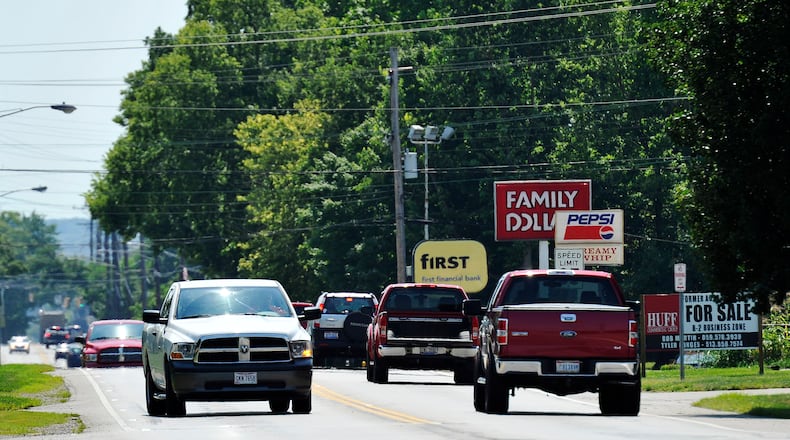“We’re doing our best guess and trying to be as conservative about it as we can, if it passes there’s a price tag that goes along with it,” Joyce-Smith said. “And I don’t believe our current general fund is going to be able to sustain it forever. Currently our revenues versus expenditures just about equal out every year.”
She said they would likely need to ask voters for an operating levy in three to four years to cover the cost. She said revenues from building permits and fines collected from zoning violations will be fraction of the expenses, “it’s not like it’s going to offset and pay for itself.”
A group of citizens petitioned the trustees to embark on the process of taking over its own zoning and the township has been working on the project for about 18 months, as required by law. The trustees held a public hearing on Thursday and Trustee Ellen Yordy said the main concern was for the cost and whether now is the right time.
Yordy said if the voters approve the zoning question they are also going to have to support sustaining it with a levy in a few years.
“If the money isn’t in the general fund we have to run an operating levy because that’s the only way we can get money to support the zoning in three, four years. Eventually that’s going to happen because we don’t get any money to speak of from (state) local government funds, they’re gone,” Yordy said. “So once we spend the money out of the general fund, we don’t have a way to put more money in unless we have an operating levy and people have to realize that.”
She said the people who want the township to control its own zoning have said they don’t like all the variances to the zoning code that are getting approved at the county level. She said they would have the same process and if residents don’t object to a variance — to a pole barn in a residential neighborhood for example — they get approved, “it’s just difficult because people don’t want to go against their neighbors.”
“If their neighbors don’t come and object to that at those hearings there’s nothing the county can do, other than to say there’s no objection to this barn so we’re going to grant it,” Yordy said. “It’s a process that has to be followed in order to make the zoning work.”
Trustee Keith Ballauer said he is still on the fence how he personally will vote on the ballot issue, knowing the associated costs, but he does feel the county “most definitely” has let the township down on some zoning matters, allowing variances some residents don’t want.
“I think township zoning could protect us more than what I think the county has,” Ballauer said. “Local zoning has the interest of Ross Twp. at hand where county zoning has to worry about everybody who doesn’t have their own zoning, so Ross Twp. to me is not put at the top of the list for concerns.”
Butler County Development Director David Fehr said of the 13 townships countywide there are six that utilize the county’s zoning services, they include: Hanover, Lemon, Madison, Milford, Oxford and Ross. He said local zoning does have its advantages.
“All zoning change decisions, whether it’s their map or how the rules are written, would ultimately be decided by the trustees versus the county commissioners,” Fehr said. “I think a lot of township residents feel like we elect township trustees to represent us, they represent us better than the three county commissioners that may not know our township as well as we do.”
Newly appointed Trustee Jen Patterson, who was a member of the zoning commission tasked with this project, said the township is still governed by the Ohio Revised Code in terms of what can be regulated and what can’t. But local zoning does give the township more power over future development.
“Residents are anxious to have more control over development in Ross and the design of buildings in Ross and this zoning code addresses a lot of those issues,” Patterson said. “There are people that have some concerns about recent building developments there, just having interesting looking, high quality buildings.”
The biggest potential development to come Ross’ way is the controversial $353 million Burns Farm project on the 350-acre farm tract at the corner of U.S. 27 and Ohio 128. The proposal is for 339 mid-level and estate homes, senior cottages and assisted living,185 rental units and 124 units of “active adult housing.” A small portion, about 25 acres, could hold a hotel and neighborhood retail.
Around 350 residents showed up at an informational meeting about the proposal in April, many opposed to the development. Ballauer and Yordy have supported the project because it is better than just letting the farm be developed “piecemeal.”
Nothing further has happened on the project since, according to former township administrator Bob Bass, who has been shepherding the project on a contract basis. He said the next move will be to have the trustees meet with developer Ron Coffman so Patterson can be briefed on the project.
He said this project probably wouldn’t be impacted by the voters decision in the fall.
“This project as it has been discussed just kind of nails what the land use plan says it should be,” Bass said. “I don’t think there’s anything going in there that would make it an automatic disqualifier, so it would be hard pressed if it got to the zoning phase to say that there’s a legitimate legal reason to turn down the zoning, regardless if it’s Ross or Butler County.”
About the Author

